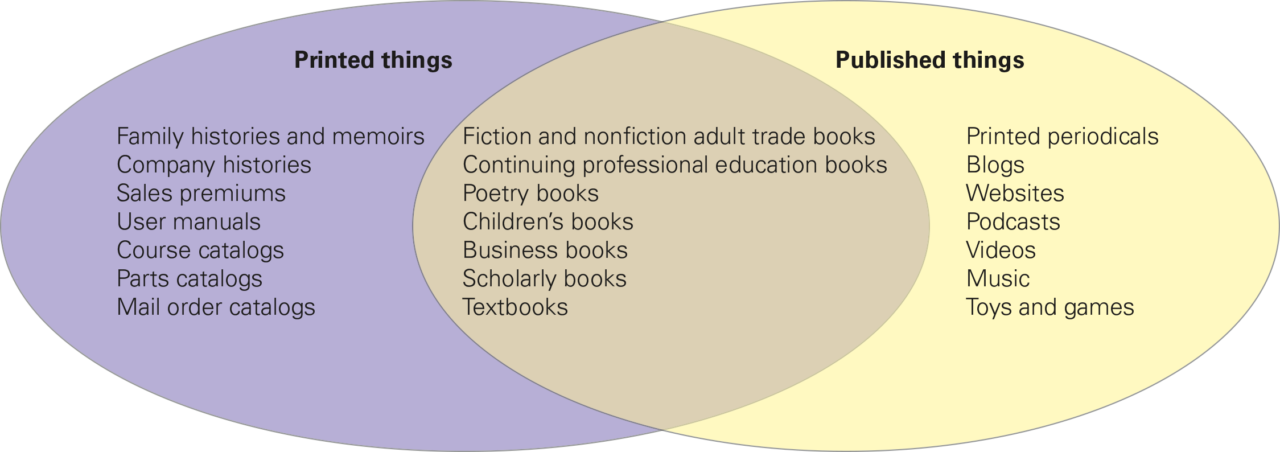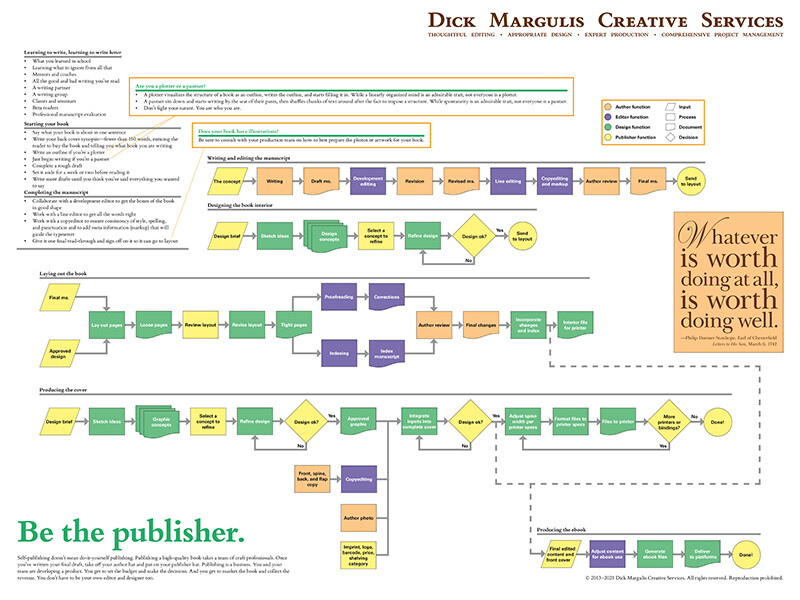You will find—have probably already found—a great deal of advice and information floating around the Web. Some of it is great. Some of it is okay. Some of it is just wrong and can lead you well astray of the path you want to be on. Here are three of the biggest false beliefs I encounter. This is by no means all or even most of the myths that are out there. But these are major ones.
1. Printing a book is publishing a book
Publishing a book is making it available to the public. You may be interested in selling the book at a profit, as most publishers are. Or you may just want to get the word out there. But the key is that you’re making it public.
You may not be interested in selling books or indeed in making your book public. You may, instead, want to end up with a privately printed book that you can give away to your family and friends, to your clients and prospects, to your customers and employees. From a production standpoint, almost all the steps to produce the book are the same (you don’t need to create a publishing imprint or buy ISBNs, and you may decide to forgo registering the copyright).
But if you are publishing the book, then you need to attend to working out a marketing plan and executing that plan (often the tail that wags the dog), dealing with the various bureaucratic requirements of establishing a publishing business (even if this is the only book you’ll ever publish), and keeping good records.
Before you seek services to help you reach your goal, have clear in your mind whether you are publishing a book or just making a book that you are not publishing. If you are publishing a book, then you are a publisher. You can drop the “self” part whenever you feel ready to do so.
Here is a Venn diagram that shows the relationship between making books and publishing books.

2. It’s not self-publishing unless I do it all myself
Self-publishing does not mean do-it-yourself publishing. Yes, it’s fun to learn new skills. But doing anything well requires training and experience. Producing a book is no different in that regard from any other kind of craft activity. You can find all sorts of advice on the Web and books in the bookstore on how to put out a DIY book, and if you have zero budget, you can do that. But don’t expect it to win awards for production values.
If you are the publisher, then think like a publisher. Decide what level of quality you want in the finished product. Figure out what aspects of the overall publishing process you have the needed skills for (as well as the time to do them). Figure out which aspects you would do well to hire a craft expert for. Can you edit your own book? Maybe, if you’re an experienced editor and are able to do what most editors cannot do, which is to edit your own work. But if you have no training or experience as an editor, this is not a good practice. Can you do your own interior book design and typesetting? Maybe you can find a template and do a passable job, and maybe that will be good enough for your purposes. But if you are planning to have a book that people admire, you should probably hire a professional book designer. Can you cobble together a cover from a template? Maybe. But most people will advise you to hire a graphic designer for the cover.
You’re no less a self-publisher for hiring professionals to do the craft work of producing your book. You don’t have to do that work yourself. You have enough work to do to market the book.
Here’s a flowchart showing the main steps in producing a book. See how much of it you want to take on yourself.

(A high-resolution 18ʺ × 24ʺ poster is available at andslash.com.)
3. If I want to be successful, I have to use a self-publishing company
Think about that for a minute. The very term self-publishing company is an oxymoron. You are the only “self” involved. The company that wants your money is not the self. And they’re not putting money at risk. So they’re not the publisher, either. They are simply a vehicle for siphoning off any possible profits for themselves after you’ve paid the full cost of producing the book.
And what are they going to do in exchange? They’re going to upload your book to Amazon (something you can do yourself for free), and they’re going to post a thumbnail of your book cover on their own website, which is a place no one—NO ONE—thinks of first when they want to buy a book.
Are they going to connect you with highly skilled editors and designers? You have no guarantee of that and no control over who they select. You can do much better on your own.
And their “marketing services” do not include any actual marketing. You’re still on your own for that. As the publisher, you’re responsible for connecting with the audience for the book and telling them where they can purchase it. Any money you pay to a vanity press for marketing just goes straight into their pocket, with nothing to show for it.
Bottom line
If you’re self-publishing, be the publisher. Work with skilled professionals to produce the book you want. Take off your author hat and put on your publisher hat. Think like a business person. Work collegially with your team. And don’t quit your day job.